Related Research Articles

Chile, officially the Republic of Chile, is a country in the western part of South America. It is the southernmost country in the world, and the closest to Antarctica, occupying a long and narrow strip of land between the Andes to the east and the Pacific Ocean to the west. Chile covers an area of 756,096 square kilometers (291,930 sq mi), with a population of 17.5 million as of 2017. It shares land borders with Peru to the north, Bolivia to the north-east, Argentina to the east, and the Drake Passage in the far south. Chile also controls the Pacific islands of Juan Fernández, Isla Salas y Gómez, Desventuradas, and Easter Island in Oceania. It also claims about 1,250,000 square kilometers (480,000 sq mi) of Antarctica under the Chilean Antarctic Territory. The country's capital and largest city is Santiago, and its national language is Spanish.

South America is a continent entirely in the Western Hemisphere and mostly in the Southern Hemisphere, with a relatively small portion in the Northern Hemisphere at the northern tip of the continent. It can also be described as the southern subregion of a single continent called America.

Salvador Guillermo Allende Gossens was a Chilean physician and socialist politician who served as the 28th president of Chile from 3 November 1970 until his death on 11 September 1973. He was the first Marxist to be elected president in a liberal democracy in Latin America.
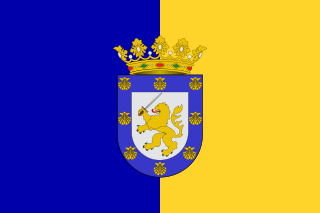
Santiago, also known as Santiago de Chile, is the capital and largest city of Chile as well as one of the largest cities in the Americas. It is the center of Chile's most densely populated region, the Santiago Metropolitan Region, whose total population is 8 million which is nearly 40% of the country's population, of which more than 6 million live in the city's continuous urban area. The city is entirely in the country's central valley. Most of the city lies between 500–650 m (1,640–2,133 ft) above mean sea level.
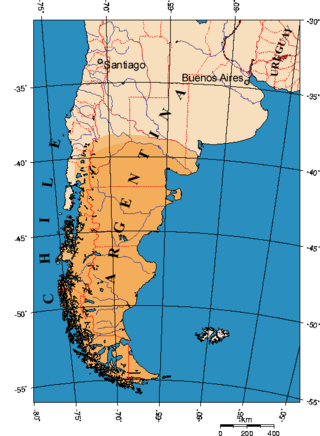
Patagonia refers to a geographical region that encompasses the southern end of South America, governed by Argentina and Chile. The region comprises the southern section of the Andes Mountains with lakes, fjords, temperate rainforests, and glaciers in the west and deserts, tablelands and steppes to the east. Patagonia is bounded by the Pacific Ocean on the west, the Atlantic Ocean to the east, and many bodies of water that connect them, such as the Strait of Magellan, the Beagle Channel, and the Drake Passage to the south.

Valparaíso is a major city, commune, seaport, naval base, and educational centre in the Valparaíso Region, Chile.

Chili peppers, from Nahuatl chīlli, are varieties of the berry-fruit of plants from the genus Capsicum, which are members of the nightshade family Solanaceae, cultivated for their pungency. Chili peppers are widely used in many cuisines as a spice to add "heat" to dishes. Capsaicin and related compounds known as capsaicinoids are the substances giving chili peppers their intensity when ingested or applied topically. While chili peppers are pungent or "spicy", there are other varieties of capsicum such as bell peppers which generally provide additional sweetness and flavor to a meal rather than “heat.”
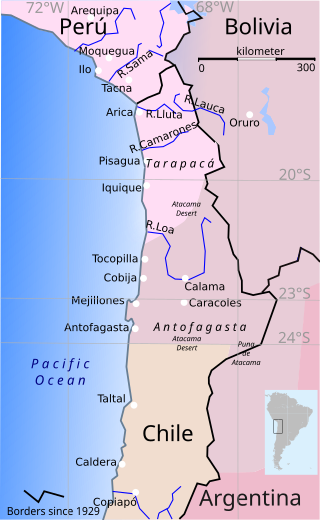
The War of the Pacific, also known as the Saltpeter War and by multiple other names, was a war between Chile and a Bolivian–Peruvian alliance from 1879 to 1884. Fought over Chilean claims on coastal Bolivian territory in the Atacama Desert, the war ended with a Chilean victory, which gained for the country a significant amount of resource-rich territory from Peru and Bolivia.
The Copa América or CONMEBOL Copa América, known until 1975 as the South American Football Championship, is the top men's football tournament contested among national teams from South America. It is the oldest still-running continental football competition, as well as the third most watched in the world. The competition determines the champions of South America. Since the 1990s, teams from North America and Asia have also been invited to compete.

The Mapuche are a group of indigenous inhabitants of south-central Chile and southwestern Argentina, including parts of Patagonia. Originally from the forests of the southern Andes, Mapuche people lived in the woods as "horticulturalists”. Mapuche populations shifted towards Argentina and Chile in the sixteenth century. The collective term refers to a wide-ranging ethnicity composed of various groups who shared a common social, religious, and economic structure, as well as a common linguistic heritage as Mapudungun speakers. Their homelands once extended from Aconcagua Valley to Chiloé Archipelago and later spread eastward to Puelmapu, a land comprising part of the Argentine pampa and Patagonia. Today the collective group makes up over 80% of the indigenous peoples in Chile, and about 9% of the total Chilean population. The Mapuche are particularly concentrated in the Araucanía region. Many have migrated from rural areas to the cities of Santiago and Buenos Aires for economic opportunities.

The 1973 Chilean coup d'état was a military coup in Chile that deposed the Popular Unity government of President Salvador Allende. Allende had been the first Marxist to be elected president of a liberal democracy in Latin America. On 11 September 1973, after an extended period of social unrest and political tension between the opposition-controlled Congress and the socialist President, as well as economic war ordered by United States President Richard Nixon, a group of military officers led by General Augusto Pinochet seized power in a coup of their own, ending civilian rule.

The Chile national football team represents Chile in men's international football competitions and is controlled by the Federación de Fútbol de Chile which was established in 1895. The team is commonly referred to as La Roja. Chile has appeared in nine World Cup tournaments and were hosts of the 1962 FIFA World Cup where they finished in third place, the highest position the country has ever achieved in the World Cup.

The Chilean Navy is the naval warfare service branch of the Chilean Armed Forces. It is under the Ministry of National Defense. Its headquarters are at Edificio Armada de Chile, Valparaiso.

The Chilean Primera División is the top-tier league of the Chilean football league system. It is organized by the ANFP. The league was previously known as the Campeonato AFP PlanVital for sponsorship reasons. In 2023, the ANFP signed a partnership with Betsson Group to become the official naming sponsor of the Campeonato Nacional, now known as Campeonato Betsson.

Alexis Alejandro Sánchez Sánchez, also known mononymously as Alexis, is a Chilean professional footballer who plays as a forward for Ligue 1 club Marseille and the Chile national team. He is often lauded as the greatest Chilean player of all time.

Chileans are people identified with the country of Chile, whose connection may be residential, legal, historical, ethnic, or cultural. For most Chileans, several or all of these connections exist and are collectively the source of their Chilean identity. Chile is a multilingual and multicultural society, but an overwhelming majority of Chileans have Spanish as their first language and either are Christians or have a Christian cultural background. Therefore, many Chileans do not equate their nationality with ethnicity, but with citizenship and allegiance to Chile. The overwhelming majority of Chileans are the product of varying degrees of admixture between European ethnic groups with peoples indigenous to Chile's modern territory.
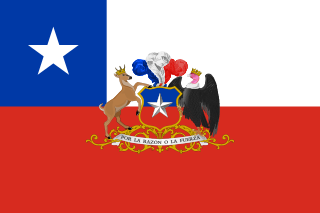
The president of Chile, officially known as the President of the Republic of Chile, is the head of state and head of government of the Republic of Chile. The president is responsible for both the Government of Chile and state administration. Although its role and significance has changed over the history of Chile, as well as its position and relations with other actors in the national political organization, it is one of the most prominent political offices. It is also considered one of the institutions that make up the "Historic Constitution of Chile", and is essential to the country's political stability.

Augusto José Ramón Pinochet Ugarte was a Chilean general who ruled Chile from 1973 to 1990, first as the leader of the Military Junta of Chile from 1973 to 1981, being declared President of the Republic by the junta in 1974 and becoming the de facto dictator of Chile, and from 1981 to 1990 as de jure President after a new Constitution, which confirmed him in the office, was approved by a referendum in 1980. His rule remains the longest of any Chilean leader in history.
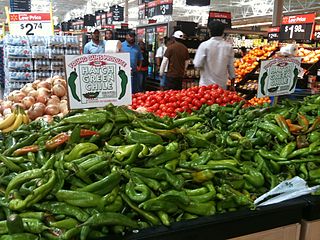
New Mexico chile or New Mexican chile is a cultivar group of the chile pepper from the US state of New Mexico, first grown by Pueblo and Hispano communities throughout Santa Fe de Nuevo México. These landrace chile plants were used to develop the modern New Mexico chile peppers by horticulturist Dr. Fabián García and his students, including Dr. Roy Nakayama, at what is now New Mexico State University in 1894.

Gabriel Boric Font is a Chilean politician who is the current president of Chile, serving since 11 March 2022. Boric studied in the Faculty of Law at the University of Chile without completing his education, and was the president of the University of Chile Student Federation from 2011 to 2012. As a student representative, he became one of the leading figures of the 2011–2013 Chilean student protests. Boric was twice elected to the Chamber of Deputies representing the Magallanes and Antarctic district, first as an independent candidate in 2013 and then in 2017 as part of the Broad Front, a left-wing coalition he created with several other parties. He is a founding member of Social Convergence, which was formed in 2018 and is one of the constituent parties of Broad Front.
References
- ↑ Chilean gazette. Chilean Embassy. 1942.
- ↑ "RECOPILACION DE GENEALOGIA CHILENA". Genealog.